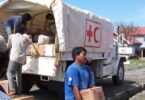The Russian central bank’s decision to raise interest rates to 21% has left Vladimir Putin’s cronies « squealing », according to an expert.
Richard Connolly, an associate fellow at the Royal United Services Institute (Rusi) made the claim after Russian defence companies and oligarchs blamed the measures for damaging the Russian economy as it continues to fund the war in Ukraine.
In October, Elvira Nabiullina, Russia’s central bank governor, raised interest rates to 21% – the highest they have been since the early days of Putin’s presidency.
The decision sparked outrage amongst Russia’s elite, with Sergei Chemezov, the boss of the state-run defence conglomerate Rostec and a former general, labelling the decision as a « serious brake on further industrial growth ».
Connolly said: « She has done a lot of things that have caused a lot of other allies of Putin to squeal. [Chemezov] has the ear of Putin. But it doesn’t matter. »
Russia‘s economy has been undeer the microscope since the illegal invasion of Ukraine, with many believing a wave of unprecedented economic sanctions would cripple the country.
The country has been hit by soaring inflation and labour shortages as the military continues to try and plug gaps in the armed forces by conscripting more and more from Russian society.
According to the central bank, 80% of Russian companies have staff shortages, with reports of firms hiring teenagers and retirees to fill gaps.
Elina Ribakova, senior fellow at the Peterson Institute for International Economics (PIIE), told The Telegraph: « It is ludicrous for an emerging market to have unemployment of just over 2pc. It has never happened in Russian history.
« They have neither the plants nor the people to be able to produce more. That is the biggest issue for Russia at the moment.
« They are at breaking point – not in the sense that they’re going to collapse tomorrow, but in the sense that they have reached the maximum of what they can produce and the maximum people they can put towards military production. »
Nabiullina has refused to rule out rising interest rates further to try and combat the rising inflation.
She said: « We have indicated that the Central Bank is open to the possibility of raising the rate, but I want to emphasise that this is not predetermined.
« Yes, there is a new pro-inflationary factor, the exchange rate, and price growth remains high, but we are already observing, according to the latest data, a credit slowdown, including corporate loans.
« Unfortunately, inflation this year will be higher than next year. But the path to our target will take all of next year and may extend into 2026. »
Source link








